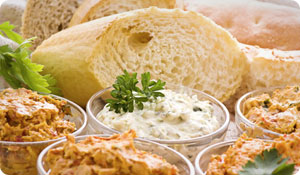
If your plumbing is clogged and you don't know why, take a good look at your recent diet. If it's low in fiber and fluids, or high in dehydrating ingredients like salt and alcohol, you may have found your answer.
Although constipation is often the result of what you're not eating, rather than what you are, some foods should go on your "limited" list until things start moving again. That includes all low-fiber foods, especially high-protein foods like meat and dairy products, and carbohydrates such as baked goods, pasta, cereals and sugary desserts that are made with refined white flour. Salty foods and alcoholic drinks are dehydrating and that, too, can lead to constipation. See if your diet is high in these common foods that may be plugging you up:
White Bread. When the bran and germ are removed from whole grains, the fiber goes with them. That's why white breads, plain pasta and many cold cereals can be constipating. The solution? Look for varieties of these same products that contain at least 3 grams of fiber per serving. If you can't handle a sudden switch to whole grain foods, try mixing whole-grain products half and half with refined. For instance, mix raisin bran with a lower fiber cereal or whole-wheat or multigrain pasta with plain semolina, or make a sandwich with one slice of white bread and one slice of whole-grain.
Cheese. Cheese, milk, ice cream and other dairy foods are all fiber-free and likely to cause constipation if you overdo it. Keep in mind that includes foods like pudding, quiches, milkshakes and lasagna. An important exception in dairy products is yogurt, which normally does not contain fiber, although varieties are now made with added fiber. The real digestive benefit of yogurt, however is that it is made with probiotic, or "good" bacteria. Some strains of probiotic bacteria have been shown to help some people move food through their systems at a faster rate.
Fried Fish. Fried foods, including batter fried seafood, chicken, onion rings and mozzarella cheese, are not only high in fat but they also tend to be low in fiber, especially those that come from fast-food restaurants. Food that is coated in breading before it is fried can be especially constipating. These foods soak up even more fat and are high in calories so they fill you up quickly and leave very little room for anything else, including healthier side dish choices that might actually help you digest fried foods if you eat them at the same time.
Meat. Meat and meat products such as sausages, bacon, and cold cuts are often high in fat and contain no fiber. If meat, poultry or eggs are taking up more space on your plate than anything else, and especially if that meat is from a high fat cut and encased in a white bread bun and served with fried potatoes on the side, you can expect a digestive slowdown.
Candy. Candy, cookies, cakes and pies and other commercially prepared snack foods are almost always low in fiber and high in sugar. In a 2005 German study on the perceived effects of different foods on the digestive system, chocolate was the one food most often associated with constipation. As with most constipating foods, however, it is a matter of balance. Sweet, low-fiber snacks and desserts are only constipating if you overdo them and don't balance your diet out with plenty of higher-fiber foods.
Sources:
Bosch, Joni. "Your Child and Constipation." University of Iowa Health Care. Web. 26 May 2010.
Johns Hopkins Medicine. "The Promise of Probiotic Yogurt." 3 August 2009. Web. 26 May 2010.
Muuler-Lissner, S. A., Kaatz V., Brandt, W., Keller, J., and Layer, P. "the perceived effect of various foods and beverages on stool consistency." European Journal of Gastroenterology and Hepatology 17(1): 109-12. January 2005. Web. 26 May 2010.
National Institute of Diabetes and Digestive and Kidney Diseases (NIDDK) of the National Institutes of Health. NIH Publication #07-2754. "Constipation". July 2007. Web. 26 May 2010.





